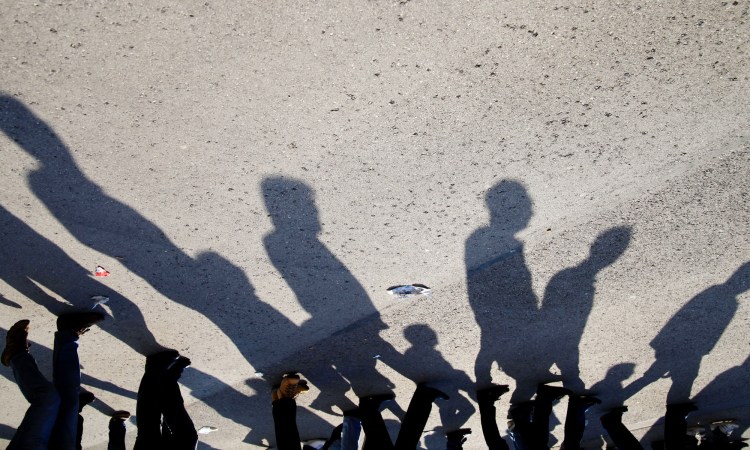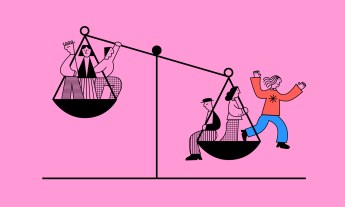
But there’s good news: the internet can help us dissolve these feelings and create new bonds of solidarity, says media theorist Douglas Rushkoff.
Once, after delivering a lecture at Berkeley in the 1960s, a psychologist took questions from the audience. A young woman stood up to explain that she understood the deep connection between people and the collective responsibility that we all shared for the world, but she didn’t know what to do next. The psychologist answered, “Find the others.”
In this day and age, how do we “find the others” — that is, find the people with whom we can connect more directly? We can start by opposing all of the conventions, institutions, technologies and mindsets that keep us apart and by restoring the social connections that make us fully functioning humans. But while challenging overt methods of separation is straightforward, our internalized obstacles to connection are more embedded and pernicious. And they all tend to have something to do with shame.
The social convention of hiding one’s wealth or lack of it has less to do with protecting one another’s feelings than protecting the power of our superiors.
For instance, we’re trained from an early age not to talk about money. Our salaries and savings are considered to be as private as our medical histories. This habit has its roots in the ascent of former peasants. When the aristocracy realized they could no longer keep ahead of the rising middle class, they sought non-monetary methods of indicating status, such as nobility of birth. Unable to keep up with bourgeois styles of dress or home decor, aristocrats pushed for less ornate aesthetics. As a result, it became classy to hide one’s wealth, rather than display it.
It’s still considered rude to ask someone how much money they make. In certain situations, we’re embarrassed if we make too little; in others, we’re ashamed if we make too much. But the whole social convention of hiding one’s wealth or lack of it has less to do with protecting one another’s feelings than protecting the controlling power of our superiors.
So, the boss gives you a salary increase — just as long as you don’t tell anyone else about it. Because if you do, everyone else will be asking for the same thing. But maintaining the secret puts you in cahoots with management, submitting to the same dynamic as an abused child who is paid in candy to keep quiet. The bribe is a bond based in shame, and the bond is broken only when the victim finds others in whom to confide — often people who’ve experienced the same abuse. Real power comes when we’re ready to say it out loud, as a movement of people opposing such abuse.
Likewise, the power of unions doesn’t just lie in collective bargaining but in the collective sensibility that unionizing engenders. The crosstalk between workers can break up management’s efforts to make them compete with one another over scraps. That’s why taxi apps and internet errand platforms don’t have features that allow workers to converse about their experiences. Crosstalk breeds solidarity, and solidarity breeds discontent.
The things people do become normal when they can’t be shamed into silence about doing them.
Religions, cults, governments, and social media platforms all use the same tactics to control members: they learn an individual’s secrets, sexual proclivities, or identity issues, and threaten to use this information against them. Some cults use lie detectors to drill down into their targets’ most shameful truths, technologies that are updated versions of the confessionals once used by churches to blackmail wealthy parishioners or to shame the poor ones into exploitative compliance. The happy explosion of new genders, racial identities, and disability intersections flies in the face of social programming designed to stigmatize differences and disadvantage those labeled outsiders.
Shaming those who deviate from the norm helps galvanize unity among the group and enforce adherence to the rules. Frat houses shame new recruits into macho antics, just as pious hypocrites shame their followers into obedience. In more prosocial hands, the same tactics can be used by schools to stigmatize bullying or by environmentalists to punish polluters. But the problem is that people and institutions behaving destructively are not so vulnerable to shame. Bullies are proud of their conquests, and corporations experience no emotions.
Social shame only truly hurts humans who are being human. It is a counterproductive way of bonding people. Human teams should be based on common hopes, needs, strengths and vulnerabilities. The internet, with its sometimes forced transparency, creates possibilities for the dissolution of shame and for new bonds of solidarity across formerly impenetrable boundaries. It’s no coincidence that a digital culture with imposed surveillance and inescapable exposure has also brought us gay marriage and cannabis reform. The things people do become normal when they can’t be shamed into silence about doing them.
Experiments have revealed that after just a few moments of awe, some people behave with increased altruism, cooperation and self-sacrifice.
Once we dispense with shame, we are liberated to experience the full, sacred, unlikely wackiness of being human. We are confident enough to leave the safety of the private computer simulation and jump into the wet chaos of social intimacy. Instead of marveling at the granularity of a VR world or the realism of a robot’s facial expression, we open our senses to the taste of the breeze or the touch of a lover. We exchange the vertigo of the uncanny valley for the exhilaration of awe.
The state of awe may be the pinnacle of human experience; it’s what lies beyond the paradox. If humans’ unique job in nature is to be conscious, what more human thing can we do than blow our minds? Beholding the panoramic view from a mountaintop, witnessing the birth of a child, staring into a starry sky, or standing with thousands of others in march or celebration — all dissolve the sense of self as separate and distinct. We experience ourselves as both the observing eye and the whole of which we are a part. It’s an impossible concept, yet an undeniable experience of power and passivity, awareness and acceptance.
Psychologists tell us that the experience of awe can counteract self-focus, stress, apathy and detachment. Awe helps people act with an increased sense of meaning and purpose, turning our attention away from the self and toward our collective self-interest. Experiments have revealed that after just a few moments of awe, some people behave with increased altruism, cooperation and self-sacrifice. The evidence suggests that awe makes people feel like part of something larger than themselves, which in turn makes them less narcissistic and more attuned to the needs of those around them.
Unfortunately, opportunities to experience awe are becoming more scarce. People spend less time camping or in nature, the night sky is polluted with light, and participation in the arts and culture is down. Art and outdoors classes in public schools have been jettisoned in favor of those that prepare students for the standardized tests on which schools are judged. There are no easy metrics for awe.
Once burned by someone manipulating awe, we become jaded and cynical as a defense against being wonderstruck.
Like any extreme state of being, awe can also be exploited. Movies use special effects and giant spectacles to leverage this feeling at specific moments in a story arc. Dictators hold huge rallies to exhilarate followers, while avoiding reasoned debate. Even shopping malls attempt to generate a sense of awe with high ceilings and giant fountains.
For a moment, awe overwhelms the senses and wipes the mind clean, making it more open to input. This helps a person take in new information but also renders them more vulnerable to manipulation. Once burned by someone manipulating awe, we are twice shy to open ourselves to it again. We become jaded and cynical as a defense against being wonderstruck.
Still, just because awe can be abused doesn’t mean we should give up on its humanizing potential. There is a difference between real awe and manipulated excitement — between staring out onto the expanse of the Grand Canyon and standing in a sea of true believers at a nationalist rally. Manufactured awe doesn’t unify; it divides us into individual consumers or followers. We become fragmented, each imagining our own relationship to Dear Leader.
True awe, on the other hand, comes with no agenda. It’s not directed toward some end or plan or person; there’s no time limit or foe to vanquish. There is no “other.” True awe is timeless, limitless and without division. It suggests there is a unifying whole to which we all belong — if only we could hold onto that awareness.
Excerpted from the new book Team Human by Douglas Rushkoff. Copyright © 2019 by Douglas Rushkoff. Reprinted by permission of W.W. Norton & Company. All rights reserved.
Watch his TED Salon: Samsung talk here:











